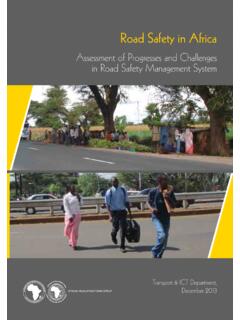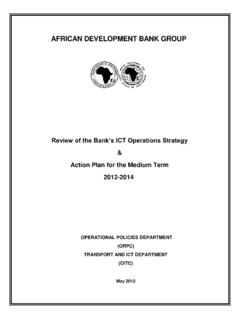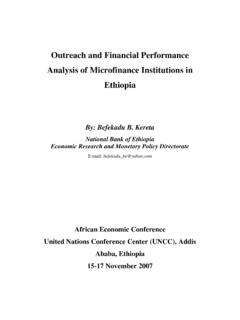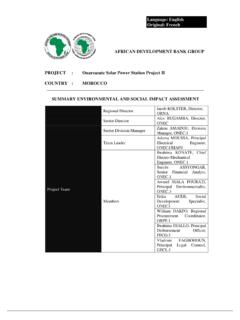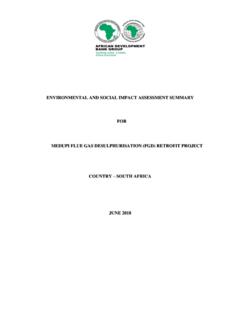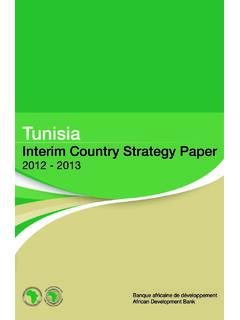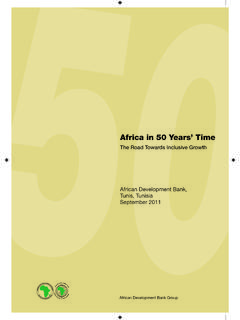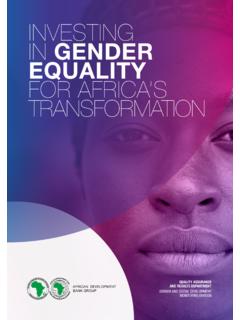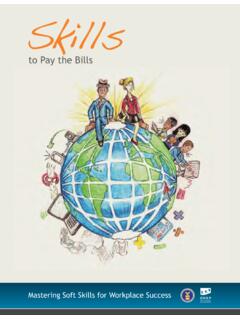Transcription of Youth in Agribusiness within an African Agricultural ...
1 BACKGROUND PAPER. Youth in Agribusiness within an African Agricultural Transformation Agenda Youth in Agribusiness Prepared by: Nteranya Sanginga , IITA. Co-Conveners Ken Lohento ,CTA. Dayina Mayenga, ILO. 0. Executive Summary Africa has the youngest population in the world and each year 10-12 million of its young people seek to enter the continent's workforce, too many without success. This highlights the great challenge of Youth unemployment but can also be seen as an opportunity for them to become the engine driving new agriculture and Agribusiness enterprises as well as rural transformation.
2 But Youth face many hurdles in trying to earn a livelihood from agriculture and Agribusiness . Pressure on arable land is high making it difficult to start new farms by the Youth interested in primary Agricultural commodity production. Youth lack access to credit, improved technologies, practical skills and fair markets necessary as well as other logistics and services for Agribusiness success. Ironically, educational services have expanded considerably in Africa without due consideration of the quality of education offered, or the skills match with employment opportunities in rural areas.
3 This has resulted in the paradox whereby a large number of graduates ill equipped to be absorbed into employment upon graduation co-exists with several unfilled vacancies and business opportunities in small- and medium-scale enterprises. Even with opportunities opening, most educated Youth find imagined futures in farming difficult. Agriculture is labor-intensive, with difficult working conditions and high risks. Productivity gaps and market inefficiencies are also widespread. Nonetheless, Agribusiness can be profitable for Youth with the right skills.
4 Rural enterprise is being advanced along Agricultural commodity value chains within the context of professionalized agriculture. As a result, training projects increasingly link Youth with access to Agricultural resources. In this way, the quality of training along Agricultural value chains, terms of credit and the Agricultural technologies, commodities and markets being advanced have a huge influence upon both the livelihoods of Youth and the process of Agricultural transformation. Clearly opportunity exists for directing African Youth toward Agribusiness , and if done in an inclusive manner, to profound societal and economic benefit.
5 Many mechanisms toward this goal are being examined by several research, development and investment interests. The next critical step is to develop a comprehensive program that forges widespread commitment and partnership, combining these approaches in an effective manner and delivering cost-effective opportunities to Youth for profitable Agribusiness development. This effort must extend well beyond reorientation within formal training settings, rather it must involve the development of detailed agri-business plans and creditworthy loan applications, leading to the establishment of efficient and effective networks of new agri-business ventures and services across the entire Agricultural value chain.
6 It must be built upon commitment at the national levels, close collaboration among and with regional development partners to support an enabling environment, and requires investment by the private sector and financial institutions. Equally important, the program must be attractive to Youth , able to challenge counterproductive mindsets through building self-confidence, and local efforts must be led and owned by Youth themselves. Overall, the interest of the Youth must be aroused and kept sustainably.
7 The Youth in Agribusiness Program is about entrepreneurship development among the Youth , including women. It will be implemented by dedicated national agencies with execution by specialized technical centers of excellence such as the International Institute of Tropical Agriculture (IITA), The Alliance for a Green Revolution in Africa (AGRA), The Forum for Agricultural Research in Africa (FARA), The Technology Center for Agriculture and Rural i Youth in Agribusiness : Challenges and Opportunity There is 364 million Africans between the ages of 15-35.
8 By 2045, the number of African Youth is expected to double 10-12 million new young workers seek employment every year. Urbanization with delayed industrialization led to "jobless growth". 60% of Africa's unemployed are young adults, this proportion is growing Africa's Youth are better educated but to many lack business skills Rural transformation requires that new and profitable ventures be initiated Proven models for rapid Youth engagement with Agribusiness are available Source: AGRA 2015. Cooperation (CTA), Technoserve and others.
9 It is founded in large part upon the ENABLE. Program, and its Youth -led experimental learning approach under development by IITA and the African Development Bank. Financial services will be provided by specialized national and regional institutions. Other important institutions such as Enspire Africa (EA), CommodAfric, SNV Development organizations of Netherlands, among others shall be involved in specialized areas such as modern internet solutions, Agricultural journalism, and other necessary handholding practices.
10 This Program is designed to reinforce the roles of disenfranchised young African adults through a comprehensive outreach effort by providing information, life-skills education, financial services, proven technologies and a menu of Agribusiness information and opportunities to at least 800,000 young people in 20 Regional Member Countries (RMCs), largely through awareness campaigns and social media. Program opportunities include at least 35,000 internships, 18,400 Agribusiness startups and 154,000 new decent jobs and contract farmer marketing opportunities.
